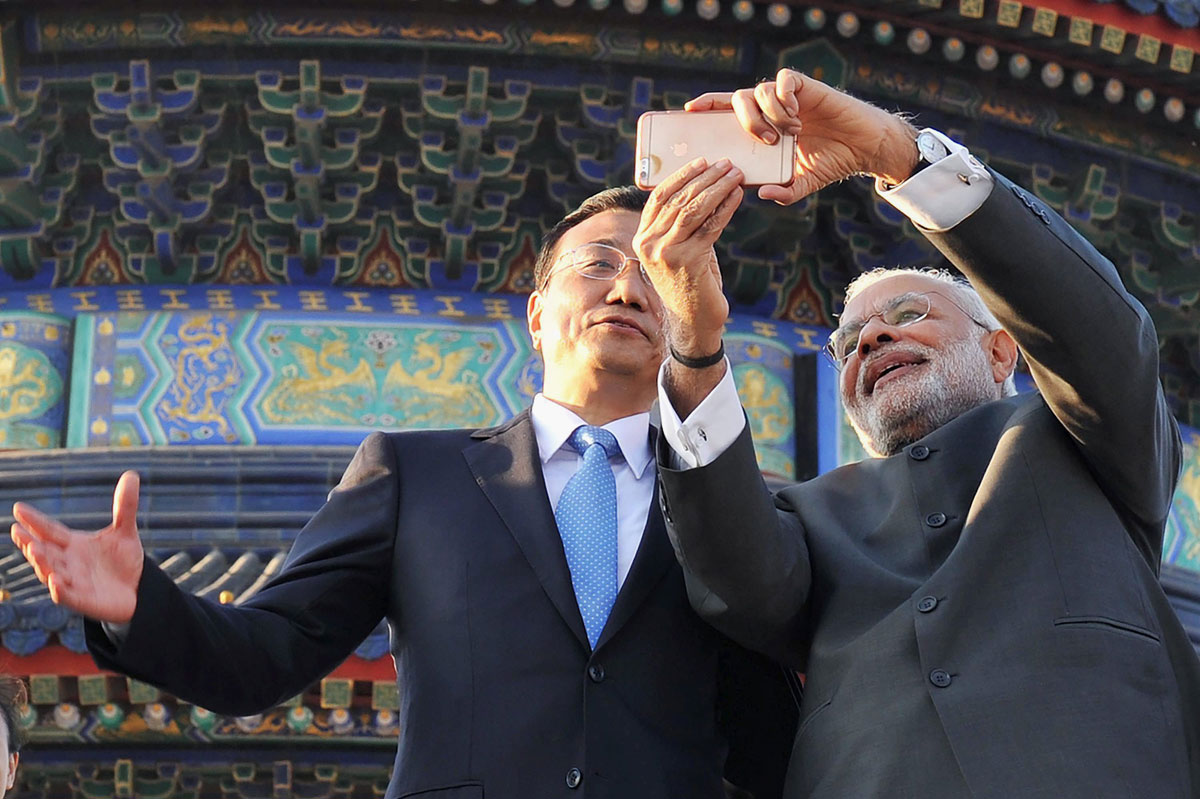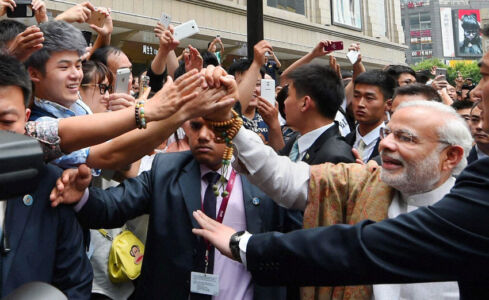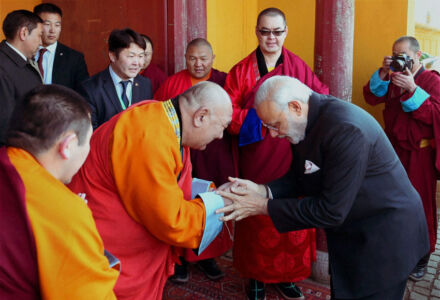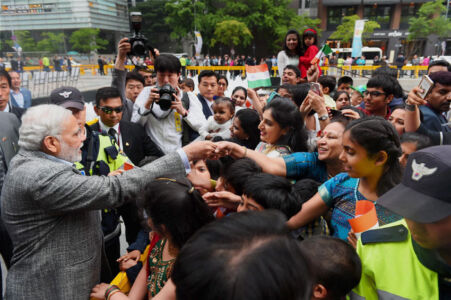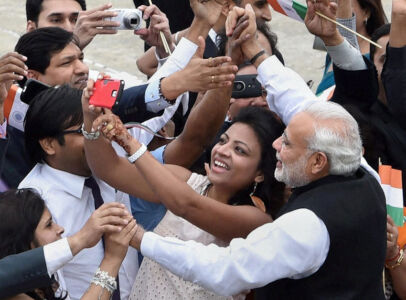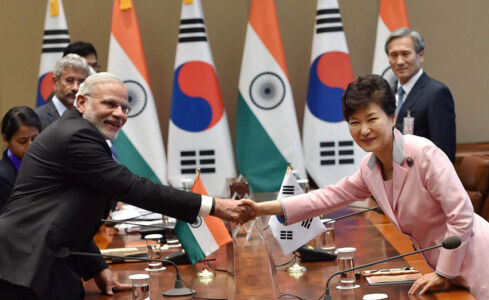TOURING ASIA
Prime Minister Narendra Modi taking a selfie with Chinese Premier Li Keqiang during a visit to the Temple of Heaven in Beijing, May 15. (Shahbaz Khan | PTI)
Indian Prime Minister recently completed a three-nation tour of China, Mongolia and South Korea. Siliconeer presents highlights of the trip.
Prime Minister Narendra Modi raised all outstanding matters with China including the boundary issue and India’s concern over huge Chinese investments in PoK in a “pleasant but forthright manner” during his recent visit, May 20, say diplomatic sources in Beijing. In addition numerous MoUs were also signed to boost cooperation between the two nations, and Indian IT giant Infosys also plans to open a center in China, writes K.J.M. Varma.
India announced a credit line of $1 billion to Mongolia, May 17, to expand its economic capacity and infrastructure, as they decided to upgrade their relationship from Comprehensive to “Strategic Partnership.” India and South Korea agreed, May 18, to upgrade their ties to ‘Special Strategic Partnership’ and deepen cooperation in defense sector as the two sides signed seven agreements including on avoidance of double taxation, writes V. Mohan Narayan.
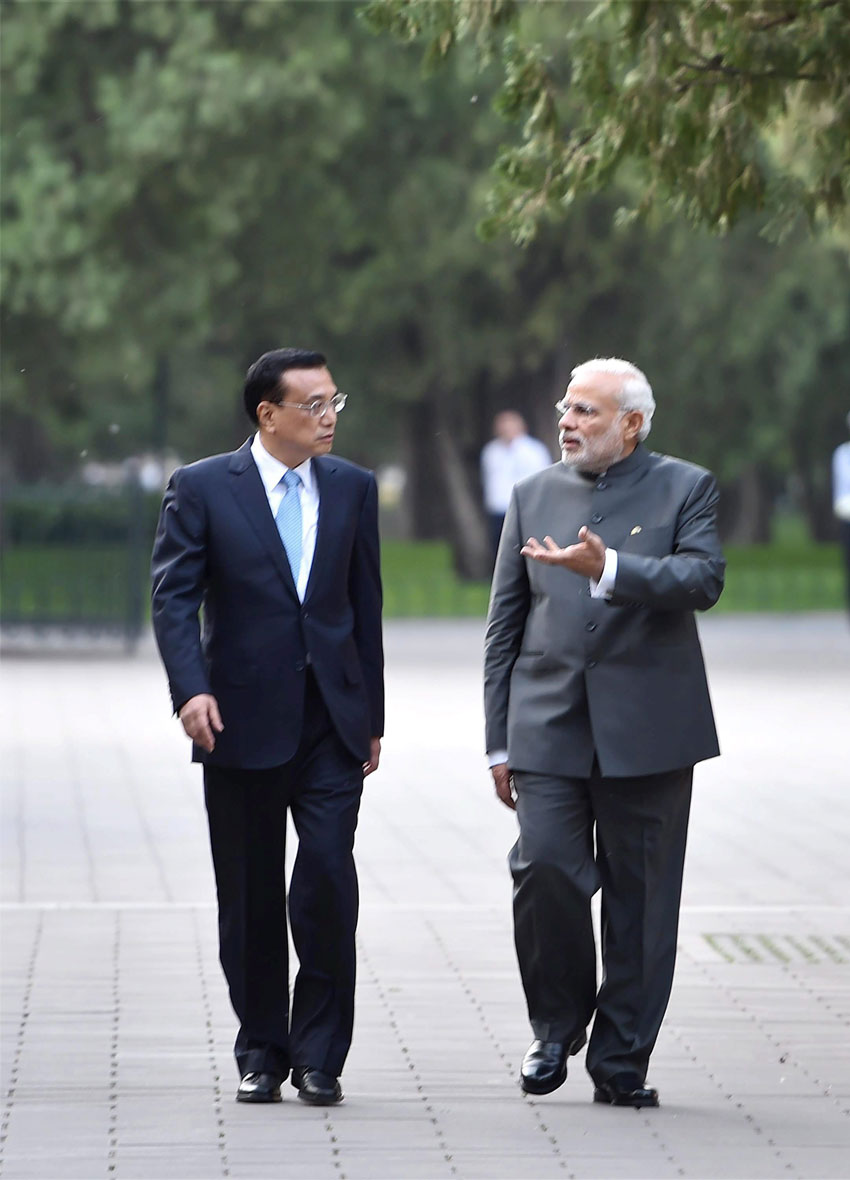
Modi in China
Indian Prime Minister Narendra Modi conveyed a “clear message” to the Chinese leadership that India is willing to expand relations with China in all aspects and both countries need to be ambitious about it.
“But at the same time if we want the full potential of the relationship is to be realized we must address outstanding issues. If do not do that it will be a limiting factor. The outstanding issues were raised by him in a pleasant but forthright manner,” the source said.
Modi held lengthy round of informal talks with Chinese President Xi Jinping on May 14 in Xi’an, the first day of his visit followed by structured talks with Premier Li Keqiang in Beijing the next day where the two sides discussed contentious issues bedeviling the two countries.
While Modi took up for the first time the issue of clarification of the Line of Actual Control (LAC), the 3,400 km long disputed boundary, during Xi’s visit to India last year, this time he has gone beyond that and referred to other issues as well, they said.
“That provides for his approach that we are prepared to deal with China in different areas and unless we address the outstanding issues, there is a limiting factor,” they said.
The message is that “we are not holding back but there is a trust deficit because of these issues,” they said.
The sources said India has been stating since 1993 that it would accept the concept of LAC without prejudice to its positions on the boundary.
Modi has raised the issue even though the Chinese side was reportedly not keen about it.
A line on the ground is useful for the management of boundary and trans-border contacts, the sources said, adding that it will help stop frequent transgressions.
While the Prime Minister has not raised the issue of close ties between China and Pakistan which is a bilateral relationship, he raised the issues relating to the POK including the China-Economic Corridor which goes through it.
Most of the issues were highlighted by Modi in his speech to the students in Tsinghua University in Beijing, May 15.
Modi has also raised the issue of Chinese practice of giving stapled visas for people from Arunachal Pradesh, which China claims as part of Tibet.
The issue of Chinese mega Silk Road and Maritime Silk Road (MSR) figured in the talks, the sources said.
Without giving details of the talks, they said India cannot give a blanket endorsement to China’s plans as it has its own initiatives. But with shared interests and synergy the two sides can work, they said.
They cited the example of India joining the Asian Infrastructure Investment Bank (AIIB) which showed India’s willingness to join in projects of shared interests, they said.
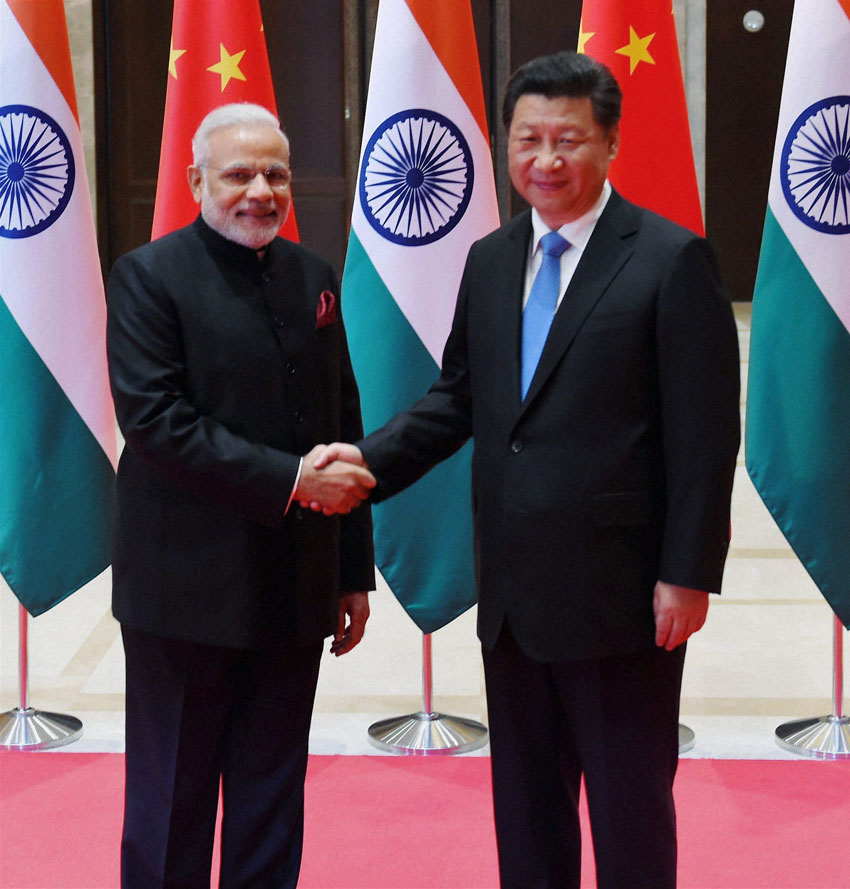
China Non-committal to Reciprocate India on Extending E-Visas
China welcomed Prime Minister Narendra Modi’s decision to grant e-visas to Chinese tourists saying the move will facilitate people-to-people exchanges, but remained non-committal to reciprocate the gesture, which was earlier opposed by Indian intelligence agencies.
“During his visit, Prime Minister Modi has announced issuance of e-visas for Chinese tourists. We welcome this move,” Chinese Foreign Ministry spokesman Hong Lei told a media briefing.
Asked if China would reciprocate the gesture, Hong said: “China is willing to make joint efforts with India under the Chinese laws and regulations so as to facilitate the exchanges of China and Indian people and seek for new development.”
On May 15, Modi announced the facility to Chinese tourists visiting India despite strong opposition from Home Ministry and security agencies over concerns that it could be misused.
The External Affairs Ministry and Ministry of Tourism, however, had pressed for e-visas to Chinese tourists to India.
Less than two lakh Chinese tourists visited India last year against the more than six lakh Indian visitors to China.
India wants to woo Chinese tourists, whose numbers have surpassed 100 million to other countries. The e-visas are expected to boost the number of Chinese visitors to India.
Hong said the Indian Prime Minister has had “successful talks” with President Xi Jinping, Premier Li Keqiang and Chairman of the National People’s Congress Zhang Dejiang.
“They exchanged views on bilateral relations and comprehensive strategic partnership for peace and prosperity and reached important consensus in this regard,” he said.
“They also signed 24 agreements covering different areas and the companies from the two countries signed USD 22 billion worth of agreements. We will implement important consensus reached by the two leaderships and elevate China, India relations to a new high,” Hong said.
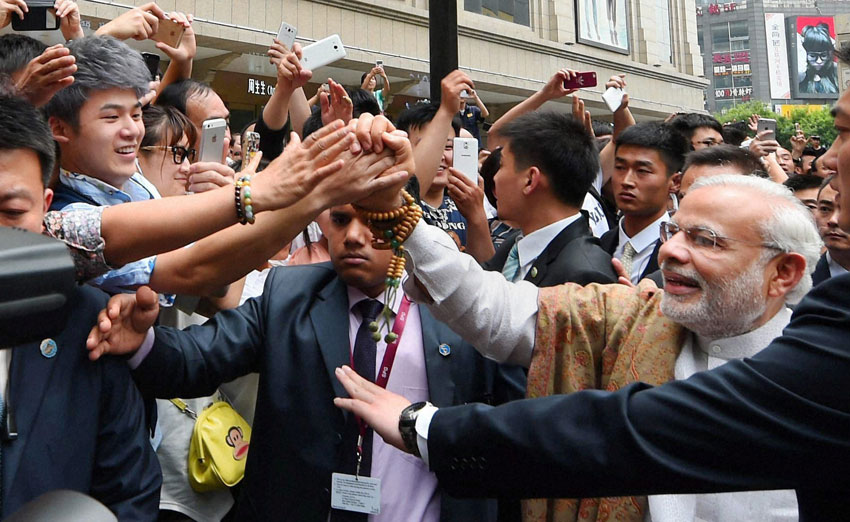
Infosys to Open First Overseas Campus in China
As India pressed China to open its markets for Indian IT firms, technology major Infosys announced, May 16, in Beijing, establishing its first overseas center outside India, in China, with an investment of about $120 million to tap in the burgeoning Chinese market.
An MOU in this regard was signed between Infosys and the local Chinese provincial government at the India-China Business Forum, which was addressed by Prime Minister Narendra Modi in Shanghai, May 16.
The development center, to be established in China’s Guizhou province, with a staff capacity of about 4,500 will help to focus on Chinese and global markets, Rangarajan Vellamore, CEO, Infosys China, told PTI.
The center, first to be established by Infosys outside India will be ready by next year, he said.
This will help to capture the growth trends of Chinese markets for Infosys China, whose annual turnover is around $120 million.
The new Infosys center is taking shape as India is pressing China to open its markets for Indian IT firms to address the $48 billion trade deficit in the bilateral trade, which stood at $70.6 billion last year.
The issue figured prominently in Modi’s talks with Chinese leadership during his three-day visit to the country.
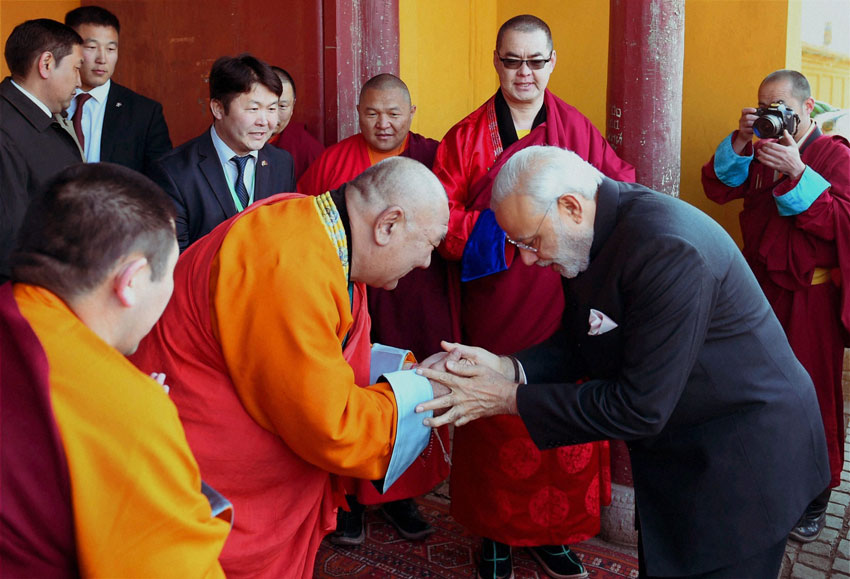
Modi in Mongolia
Narendra Modi, the first Indian Prime Minister to visit Mongolia, held wide ranging talks with his counterpart Chimed Saikhanbileg in Ulan Bator, following which the two sides inked 14 agreements covering defense, cyber security, agriculture, renewable energy and health sector.
“I am pleased to announce that India will provide a Line of Credit of $1 billion to support expansion of Mongolia’s economic capacity and infrastructure,” Modi said at a joint press interaction with Saikhanbileg at State Palace.
Asserting that Mongolia is an integral part of India’s Act East Policy, he said the destinies of the two countries are closely linked with the future of Asia Pacific Region.
“In a reflection of our commitment to further deepen our relationship, we have decided to upgrade our Comprehensive Partnership to ‘Strategic Partnership’,” he said.
Stating that it was a great honor to be the first Prime Minister of India to visit Mangolia, Modi said, “It is a special privilege to come on the occasion of two important milestones that unite us – 25 years of democracy in Mongolia and 60 years of diplomatic relations between our two nations.”
Commenting on his counterpart Saikhanbileg’s remarks that India is the “spiritual neighbor and third neighbor” of Mongolia, Modi said, “We will always fulfill the responsibility that comes with this honor.”
“The agreements that we have just signed speak to the depth of the relationship. These cover economic relations, development partnership, defense and security, and people-to-people contacts,” the Prime Minister added.
Modi said the cooperation between National Security Councils of the two countries will provide a strategic framework for cooperation.
India will also help establish a cyber security center in Mongolia’s defense and security establishment.
Noting that the trade and investment relations between two countries are modest, Modi said, “We will take our economic partnership to a new level.”
“There is huge potential in civil nuclear sector, mining, healthcare, pharmaceuticals and dairy. We should also explore the possibilities of using digital technology to expand our economic relations,” he said.
He also announced to increase the ITEC training slots for Mongolia from 150 to 200 and establish an India-Mongolia Joint School.
Modi, who arrived in Ulan Bator on the second leg of his three-nation tour, was earlier given a ceremonial welcome at the State Palace.
India already has a civil nuclear agreement with Mongolia which provides for uranium exports to the country once the domestic laws here permit prospecting and mining.
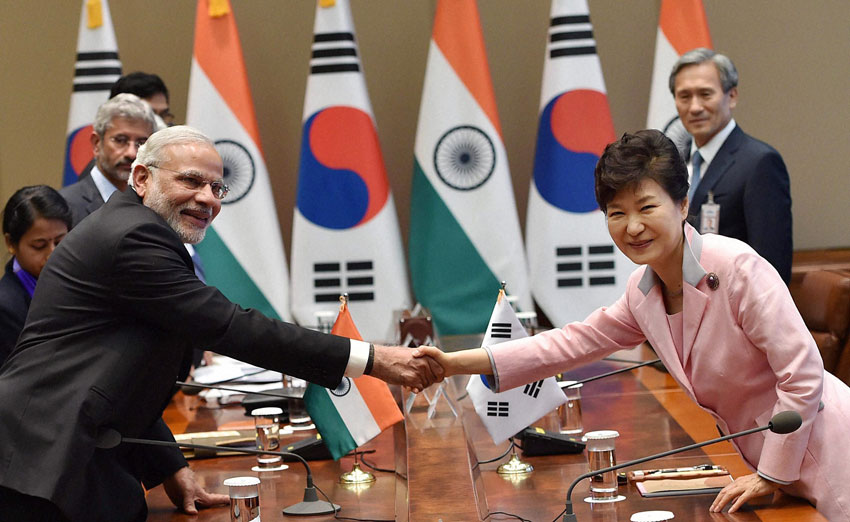
Modi in South Korea
Prime Minister Narendra Modi, arrived in Seoul, May 18, from Mongolia on the last leg of his three-nation tour. He held wide-ranging talks with South Korean President Park Geun-hye at Cheong Wae Dae, the office and residence of the President.
“We have agreed to upgrade the bilateral relationship to ‘Special Strategic Partnership’,” Modi said at a joint press interaction with President Park after their “excellent” talks.
“We have laid the foundation for a relationship that two major Asian countries with shared values should have,” he said, adding that decisions made today reflect how seriously the two countries take the new framework of the relationship.
Noting that India considers South Korea a “crucial partner” in its economic modernization, Modi said South Korea can be a leading partner in India’s efforts to develop a world class manufacturing sector.
The Prime Minister said South Korean President’s response has been positive on the participation of Korean companies in the defense sector in India.
The two sides signed seven agreements covering Avoidance of Double Taxation and Prevention of Fiscal Evasion with Respect to Taxes on Income, MoU between National Security Councils of the two countries, MoU on shipping and transport.
“We had extensive discussions on economic relations,” he said, adding that he conveyed to President Park India’s desire to see a balanced and broad-based growth in bilateral trade.
Modi said many South Korean brands are household names and Korean companies have the edge to succeed in India.
The two leaders also had productive discussions on international issues.
The two leaders also discussed their engagement in the East Asia Summit and with ASEAN.
“We have a shared interest in an open, balanced and inclusive regional architecture. We have common views on maritime security in this region,” he said, adding the two sides have agreed to work together and with other countries in the region to ensure the freedom of navigation and safety and security of sea lanes of communication.
The Prime Minister also voiced concern over challenges of cyber security and terrorism, saying these are also “areas of interest to both of us.”
